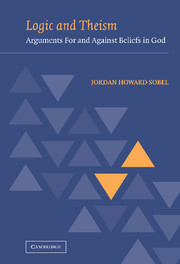IX - Romancing the Stone
Published online by Cambridge University Press: 28 July 2009
Summary
“When I use a word,” Humpty Dumpty said, in rather a scornful tone, “it means just what I choose it to mean – neither more nor less.”
Lewis CarrollI call a fig a fig, a spade a spade.
MeanderON THE ‘COMMON NAMES’ OF GOD
[W]hen most of us … think of God, the being we think of is in many important respects like the God of the traditional theologians. It will be helpful, therefore, in clarifying our own thoughts about God to explore … the conception of God that emerged in the thinking of the great theologians. (Rowe 1993, p. 5)
‘Exploring,’ we find the big three of omnipotence, omniscience, and perfect goodness, and also such as everlastingness (sometimes eternality or atemporality) and being the creator. These are frequently enhanced properties that God would have essentially. This chapter is about omnipotence, bare and essential. Other attributes and aspects of the common conception come in for comment, but only in connection with omnipotence. The next chapter is about omniscience considered quite alone. An appendix to Chapter XII studies omniscience in combination with freedom, mainly human. Not pursued in this book are problems with what would be perfect goodness alone, if it would include justice and mercy. Reconciling virtues of justice and benevolence is a problem not only for what would be their divine realizations, but there should be special difficulties to the project in that case.
Information
- Type
- Chapter
- Information
- Logic and TheismArguments for and against Beliefs in God, pp. 345 - 368Publisher: Cambridge University PressPrint publication year: 2003
